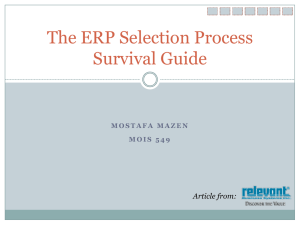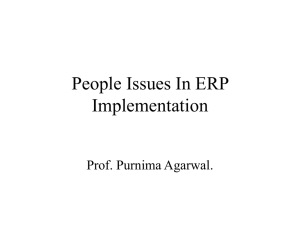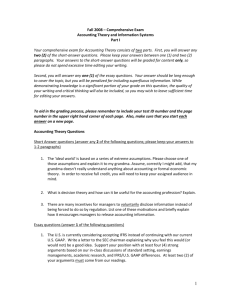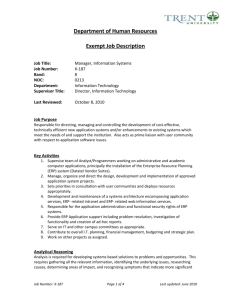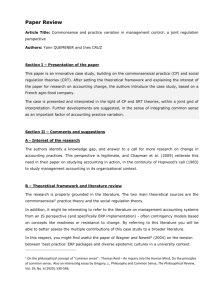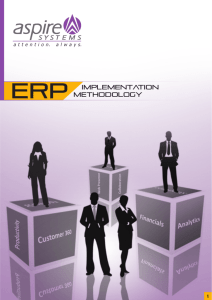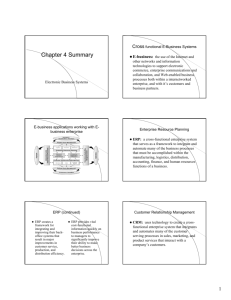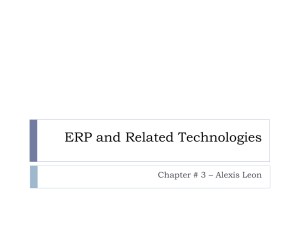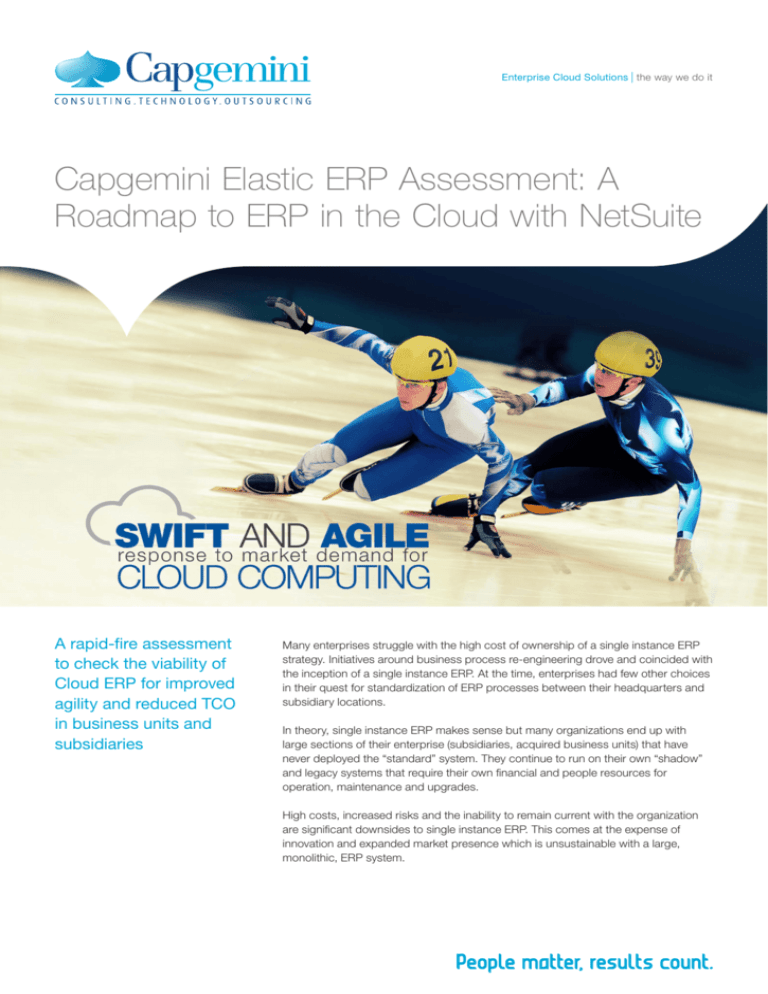
Enterprise Cloud Solutions the way we do it
Capgemini Elastic ERP Assessment: A
Roadmap to ERP in the Cloud with NetSuite
A rapid-fire assessment
to check the viability of
Cloud ERP for improved
agility and reduced TCO
in business units and
subsidiaries
Many enterprises struggle with the high cost of ownership of a single instance ERP
strategy. Initiatives around business process re-engineering drove and coincided with
the inception of a single instance ERP. At the time, enterprises had few other choices
in their quest for standardization of ERP processes between their headquarters and
subsidiary locations.
In theory, single instance ERP makes sense but many organizations end up with
large sections of their enterprise (subsidiaries, acquired business units) that have
never deployed the “standard” system. They continue to run on their own “shadow”
and legacy systems that require their own financial and people resources for
operation, maintenance and upgrades.
High costs, increased risks and the inability to remain current with the organization
are significant downsides to single instance ERP. This comes at the expense of
innovation and expanded market presence which is unsustainable with a large,
monolithic, ERP system.
Capgemini Elastic ERP in the Cloud with NetSuite
Elastic ERP -is retaining one, legacy on-premise system for a corporate headquarters
and adopting the NetSuite ERP in the Cloud for outlying business units and
geography’s that are lighter weight, faster and easier to deploy and customize. This
elastic strategy provides a standard, template based deployment for subsidiaries
while reducing the overall number and variety of distinct systems throughout
the organization. This strategy also accommodates expansion, contraction and
consolidation for the enterprise and allows CFOs and controllers dramatically
simplified financial consolidation, fewer systems to track, and effective financial and
management reporting.
Moving to Elastic ERP
Single Instance
ERP and Disjointed Edges
Elastic ERP-Independence Frees Up
Innovation at Edges
Divestiture
Divestiture
Acquisition
Distributor
Core ERP
Core ERP
Subsidiary
Acquisition
Distributor
Operating Unit
Subsidiary
Operating Unit
Roadmap to Elastic ERP
Gap-fit analysis
Stage-1
Map business priorities
and localization requirements
Determine integration
requirements
Identify elastic options
and baseline costs
Apply scenarios and
identify change
management issues.
Stage-3
Stage-2
Analyze global
process model
Assess current
ERP landscape
Which apps reside in
which locations
Understand stakeholder
objectives
Review as and to-be
process models.
Deliverables and
recommendations
Business case and
roadmap validation
Proposed site list and
ROI model
Deployment and
rollout plan
Case Study:
Situation – $7B fortune 500 Global Manufacturer and Distributor present in almost
100 countries worldwide was facing a large Oracle upgrade for one of their large
global divisions.
Approach – In their desire to standardize and optimize processes across their global
sites and lower costs associated with the subsidiary countries, they evaluated
SaaS and cloud solutions including NetSuite.
Solution – Capgemini developed an elastic blueprint and strategy based
on considerations such as gap/fit analysis of process fit, subscription costs,
implementation costs, total cost of ownership and ROI comparisons
for alternative solutions.
Result – Scope of elastic strategy is currently set for 21 countries with > 25%
savings projected
Why Capgemini
• Industry Cloud leadership and domain expertise for global scale assessments,
integration and enterprise complexity
• Industry leading Cloud ERP application and domain expertise in numerous
industry sectors
• End-to-end domain knowledge of enterprise (SAP/Oracle) ERP processes in
distributed environments
• Pedigree of managing organization-wide transformation…not just implementation
• Proprietary assessment methodology provides fast time to value through early
visibility of reduced TCO and enhanced ROI
Enterprise Cloud Solutions the way we do it
For more details contact:
Fred Landis
Sr. Manager, Enterprise Cloud Services
NetSuite Global Alliance Lead
Fred.landis@capgemini.com
About Capgemini
With more than 130,000 people in over 40 countries, Capgemini is one of
the world’s foremost providers of consulting, technology and outsourcing
services. The Group reported 2013 global revenues of EUR 10.1 billion.
Together with its clients, Capgemini creates and delivers business and
technology solutions that fit their needs and drive the results they want.
A deeply multicultural organization, Capgemini has developed its own
way of working, the Collaborative Business ExperienceTM, and draws on
Rightshore®, its worldwide delivery model.
Learn more about us at
www.capgemini.com
The information contained in this document is proprietary. ©2014 Capgemini.
All rights reserved. Rightshore ® is a trademark belonging to Capgemini.

